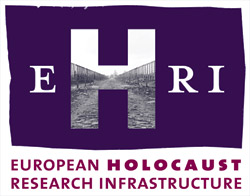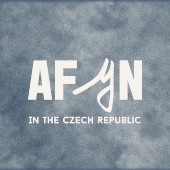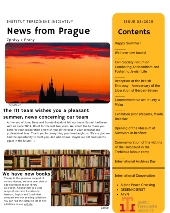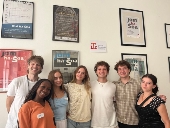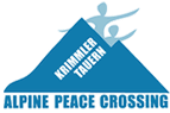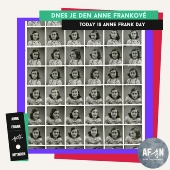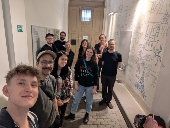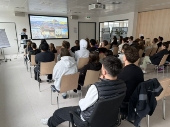Facing History and Ourselves towards Today´s Society. Using History in the Civic Education
A two-year project implemented by the Terezín Initiative Institute in cooperation with partners Romano jasnica and Kharomo Chodov o.p.s.
Implementation period:
- 1 October 2020 to 30 September 2022
Annotation:
For effective understanding to the present, strengthening in it and to decide to engage in society, it is necessary to adopt democratic values, the will to acquire information and the skills to work with them. Facing history and ourselves towards today society project offers interconnected activities that lead to an understanding of our identity and history’s influence on our perception of today. Cooperation with organizations in structurally affected regions directly with members of the Roma community enables the majority and Roma com.connection, taking into account their attitudes and needs.
Our target groups:
- lecturers/educators who (after completing the course), will be able to teach lessons using the Facing History and Ourselves method in schools; including Roma lecturers and university students with pedagogical specialisation;
- teachers of all type of schools, lecturers/educators, students of pedagogical faculties or didactics of history – attend a seminar for teachers, then teach according to the FHAO method and using methodologies from seminars in their schools, participate in activity 5 by their own participation and students with implementation proposed activities;
- young people: students of secondary schools, grammar schools, clients of low-threshold facilities – complete educational programs led by ITI lecturers and subsequently trained lecturers from the course, shoot video clips, participate in student conferences and then implement a project designed.
Goals:
- What? Through history lead to thinking about our present, personal and group identity, our place in the world and what we can achieve through our own activity.
- How? Through a course for lecturers/educators, programs for schools, the shooting of clips with young people, public debates and a student conference that brings together all three target groups.
- Why? If we understand the context, we can apply our knowledge in the real world, we understand the causes of our attitudes and we are willing to change them, we are stronger, more confident and we know our value.
The biggest challenge of the project:
Align the target groups of the project so that participants have the opportunity to get to know each other, understand the different starting conditions and motivations, and inspire and strengthen each other in the effort to change for the better.
The biggest benefit of the project:
Getting to know people who would not otherwise meet.
Consistency with the strategy of the Terezín Initiative Institute:
The ITI's strategy is based on three pillars: 1. research on Nazi persecution in the Czech lands and in Europe and documentation of its victims, 2. remembrance and 3. education against racism, anti-Semitism and xenophobia. Since 2015, we have been working on the Roma Holocaust, its causes and consequences. The study of the processes leading to the Holocaust shows that prejudice and hatred, together with ignorance and unwillingness to find informations and critically evaluate informations, lead to tragic consequences. The result is the insecurity of people belonging to marginalized excluded groups, the disruption of trust in their own culture and traditions, the loss of identity. Therefore, in the project we focus on knowledge, but above all on values, attitudes, skills, activity, communication and self-confidence.
Project activities:
- Capacity building of Terezín Initiative Institute.
- Course for lecturers/educators.
- Two days educational seminars for teachers.
- Educational programs for youth.
- Filming clips with young people and arragment of public debates to them
- Student conference for all target groups of the project.


The project is being supported by the Open Society Fund Prague from the Active Citizens Fund. The programme promotes citizens’ active participation in the public life and decision making and builds capacities of civil society organizations. The Active Citizens Fund is financed from the EEA and Norway Grants.
Three weeks have already passed since the International Youth Forum started in South Carolina, hosted by the Anne Frank Center at the University of South Carolina (USC). Our very own Ani from Afyn.cz was one of the delegates. She has shared her reflections on the experience, what she learnt, and what she will take away from it. Read her report to get a glimpse of the IYF 2025!
It's the middle of summer, and we're bringing you the latest issue of our newsletter, News from Prague. We wish you a wonderful rest of your vacation and enjoyable reading.
This week, a group of students from the US (some with Czech family ties) has visited us as part of their summer school in the Czech Republic organised by the Mestenhauser Institute for International Collaboration (MIIC).
Our GEDENKDIENST-Volunteer Laurenz joined the Alpine Peace Crossing (APC) in Krimml to cross the Austrian Alps in remembrance of the thousands of Jews who fled the antisemitism that was still rampant in Europe after 1945. Laurenz welcomed the team to Jachymka a few weeks ago.
Yesterday we celebrated Anne Frank's legacy in a creative way by showcasing the artworks submitted by talented contributors at Žižcafé Therapy.
On Saturday our GEDENKDIENST volunteer Laurenz welcomed the team of the Alpine Peace Crossing to Jachymka to show them our work.
Alpine Peace Crossing (APC) is an Austrian organization based in Krimml (Salzburg province).
Our Volunteer Laurenz was in Austria last week to promote the GEDENKDIENST program at his former school, the HAK 1 in Salzburg. Speaking to about 60 people from the 4th grade he talked about his experiences and encouraged the students to also use the opportunity to do a Gap-Year with a positive impact. Besides the remembrance work and the work and history of our institute, Laurenz told the students about the challenges and the many wonderful things that come with moving abroad and starting a new job fresh out of school.
We want to thank the HAK 1 business school in Salzburg for giving Laurenz the opportunity to promote the program and the students for their keen interest.






